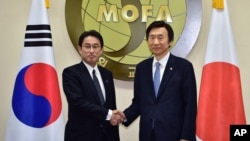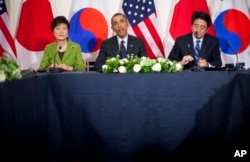A landmark agreement between Japan and South Korea over so-called “comfort women” could pave the way for enhanced cooperation on regional threats such as North Korea’s nuclear program, a senior State Department official said.
On Monday, Japan and South Korea announced a settlement over the longstanding dispute involving Japan’s responsibility for Korean woman forced to work as prostitutes for the Japanese military during World War II.
The agreement includes over $8 million in financial restitution from Japan as well as an official apology.
Any impediment to full cooperation between the U.S. and allies such as Japan and South Korea “represents a strategic drag on our national security interests,” the official said in a Monday briefing.
“There is no need to look any further than North Korea, which has made a practice of seeking to divide the five members of the six-party [nuclear] talks,” the official added.
In October, North Korea rejected calls to resume international talks on ending its nuclear program.
The so-called six-party talks with the U.S., Japan, South Korea, China and Russia, broke down in 2008, after North Korea refused to cooperate with inspectors who were seeking to verify its compliance with the agreement.
Pyongyang has since conducted several nuclear tests, further undermining the agreement.
The U.S. applauds the leaders of the two countries for “having the courage and vision to forge a lasting settlement to this difficult issue,” said National Security Adviser Susan Rice.
President Barack Obama’s administration has strongly supported reconciliation efforts.
“We have worked quietly where possible to prevent or resolve misunderstandings between the two,” said the senior State Department official.
Obama hosted talks between Japanese Prime Minister Shinzo Abe and South Korean President Park Geun-hye, last year.
Also, Secretary of State John Kerry has held talks with officials from both countries.
In his response to the Monday agreement between the two countries, Kerry said, “We look forward to continuing to work with both countries on regional and global issues, including advancing our economic ties and security cooperation.”
That security cooperation could include further efforts to address North Korea’s military build-up.
“North Korea presents a serious threat to Japan, Korea and for that matter the United States,” said the State Department official.
The world cannot afford for the three countries to “operate at anything less than full capacity in terms of security cooperation," the official added.





